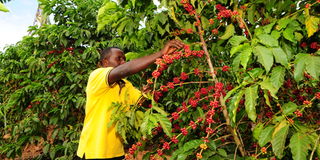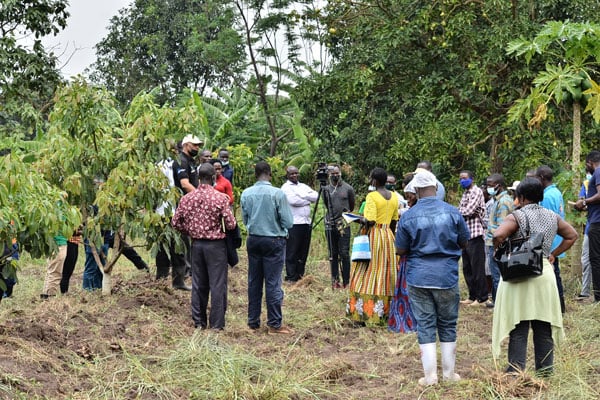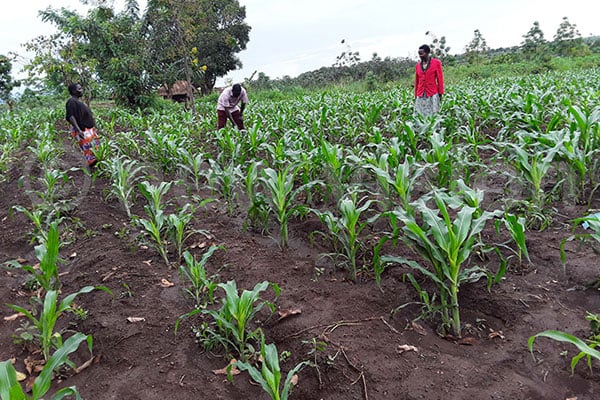Is agro-processing the magic bullet to unemployment?

Julius Muganga, a coffee farmer. Government should invest resources in some economic sub-sectors that can generate more jobs for youth. PHOTOS/Rachel Mabala
What you need to know:
Agribusiness, according to researchers, has the potential to absorb large unskilled labour force, enhance productivity, and export growth. But agricultural supply chains linking farmers to output markets are still underdeveloped and fragmented.
Securing a decent job is one of the most challenging tasks for most youth in the country. Even more troubling, according to a new report titled: Work and Income for Young Men and Women in Africa: The case of Uganda, is that more than 87 percent of youth in Uganda work in insecure, low-income and often unsafe informal-sector jobs or in family income generation activities with little or no pay at all.
All this is playing out in the midst of government’s efforts to increase youth employment through initiatives such as Youth Entrepreneurial Scheme (YES) programme - introduced in 1995 as a loan scheme for youth who wished to venture into business, the Youth Venture Capital Fund (YVCF) – unveiled in 2011 to create jobs and expand business.
Then there is the Young Livelihood Programme (YLP) – started in 2013, targeting the unemployed and poor youth. This is in addition to Uganda Women Entrepreneurship Programme (UWEP) initiated in 2015 targeting unemployed women.
Despite all the government initiatives and programmes to either trigger or find employment to the majority young population, most researchers, economists and policy analysts, including the authors of this report say it is a wrong solution to the unemployment question. According to the findings of the report, “it remains unclear of what works to support youth in the labour market.”
Whereas the World Bank’s latest investigations narrow down on agribusiness, the EPRC research findings shows that the government is better off investing its time and resources in some key economic sub-sectors that can generate more jobs for youth such as tea, coffee, wholesale and retail trade, agro-processing and animal husbandry.
“The agriculture sector would generate more jobs for youth and women, followed by services and lastly the industry sector,” Dr John Mutenyo, the lead researcher said while disseminating the report last week in Kampala.
The senior lecturer at the School of Economics, Makerere University also noted that in addition to indirect jobs created from those sub-sectors, agro-processing would generate more jobs for youth and women than the services sector.
The two - agribusiness and agro-processing, both fit the bill and therefore a common meeting point for both the local based researchers and the World Bank investigators.
Policy recommendations
According to the two authors of the report— Dr Mutenyo and Dr Faisal Buyinza, both from the Makerere University School of Economics, their findings show that the key barriers for youth and female workers in accessing job opportunities in the identified sector include limited skills and high leakages. These barriers could be removed through skilling youth and encouraging import substitution especially for products that require local and available raw materials.
For example, about a third of the potential output from an additional demand for industrial goods leaks out of the economy thus exporting jobs.
So, to stop “donating of jobs outside the country” the report recommends sectors such as agriculture (especially cash crops), agro-processing, wholesale and retail trade, tourism and transport services if it is serious about accelerating jobs.
“Supporting the agriculture sector would require complementary efforts of investing in agro-processing to create market and add value for the agricultural products. This should go hand in hand with support to skilling youth in sectors with high potential for decent job creation, for instance, agro-processing entrepreneurship.”
The research recommends infrastructural development in both rural and urban areas “to equalise rural and urban differences. While this is happening, cash-crop production, light manufacturing, construction, agro-processing, financial and insurance and tourism sectors should all be promoted.
To address the country’s productivity and job challenge, focus must be put on growth sectors that require large workforce and low skilled labour, according to a World Bank report.
However, the Economic Policy Research Centre (EPRC) in conjunction with the African Economic Research Consortium (AERC) and Knowledge Platform on Inclusive Development (INCLUDE), says attention should be placed on sectors that not only generate multiple jobs, but are also easy to establish.
For the World Bank, according to its latest investigations, agribusiness should be the main focus attention, given its potential to absorb large unskilled labour force, enhance productivity, and export growth. This is contained in a report titled: Country Private Sector Diagnostic (CPSD). This report set out to investigate the potential for greater private sector investment to meet development challenges such as the country’s low productivity and growing unemployment questions.
The IFC report with some degree of certainty implies that agribusiness working in tandem with the energy sector which is an enabler of overall productivity; and housing because of its role in fueling growth in the labour-intensive construction sector, will provide the prescription to the productivity and unemployment challenges.
With some success achieved in the fish, dairy, and maize value chain in the agribusiness sector, the CPSD authors say that it demonstrate the necessity for private investment in agribusiness, but first government must pave way for that to happen with ease and regularity.
Case for agribusiness
For starters, Uganda’s natural topography, favourable climate, ample water sources, and low labour costs give it a strong comparative advantage in agricultural production.
The open trade regime has helped the emergence of a successful agro-industry for exports with eight of Uganda’s top 10 export industries found in agribusiness, including fish, dairy, and maize—the three value chains of focus. These products reach a wide number of destination markets, with some products capturing significant market share.
Foreign Direct Investment into the sector had been increasing steadily prior to the pandemic, more than tripling from 2010 to 2019, when it reached $230 million according to World Bank statistics.
More than two-thirds of formal agribusiness exporters earn over $1 million in annual revenue, demonstrating rewards to economies of scale and potential to turn a profit, even in small margin industries.
With its favourable agricultural conditions and lower labour costs, the World Bank investigators and researchers believe Uganda is in a strong position to grow its agribusiness. But agricultural supply chains linking farmers to output markets are underdeveloped and fragmented. Also, financial institutions shy away from the sector, which has contributed to the second-highest percentage of nonperforming loans when compared to other sectors like manufacturing and real estate.
They say...
“Agribusiness can contribute to foreign exchange earnings. But, there is need for value chain intervention by way of investing in its development,” Ms Mona Ssebuliba, a value addition expert.
“Yes, in terms of growth I can agree agribusiness has some leverage, but so is a sector such as tourism and hospitality. It shouldn’t be ignored. It should be up there in terms of focus with sectors such as agro- processing,” Dr Madina Guloba, Senior Research Fellow at EPRC.
“We must ensure that most of our farmers are engaged commercial agriculture as opposed to subsistence farming which is the case right now. This is so because of lack of enough land to practise commercial agriculture as well as limited knowledge on modern farming practices,” Mr Ibrahim Ogaram, an agro- ecologist with the Hunger Project Uganda.
“Many people still engage in subsistence agriculture because of poor land policies, lack of markets and weak value chains, but there is an urgent need to finance agricultural value chains in the country,” Grace Musimami, the Secretary General, Uganda Agricultural Extension Association.





